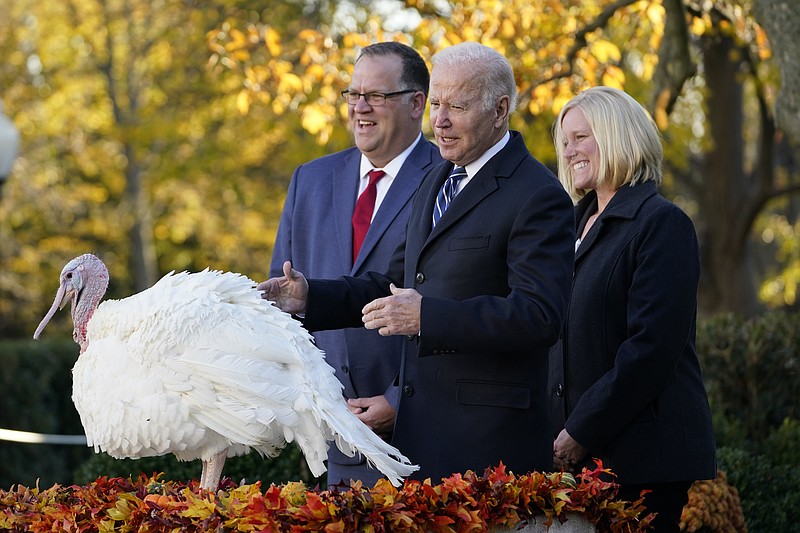One hundred years ago, Chattanoogans celebrated Thanksgiving on Nov. 30, the fifth Thursday in the month.
Yep, the fifth Thursday -- one day before December.
While George Washington, in his first term as president, declared Thursday, Nov. 26, 1789, as a "Day of Publick Thankgsgivin," the day didn't stick on the fourth Thursday. It moved around a bit, depending on presidential proclamations and whether state officials wanted to celebrate on a different day.
Finally, President Abraham Lincoln, in his 1863 address, made it the last Thursday in November.
"I do therefore invite my fellow citizens in every part of the United States, and also those who are at sea and those who are sojourning in foreign lands," he wrote, "to set apart and observe the last Thursday of November next, as a day of Thanksgiving and Praise to our beneficent Father who dwelleth in the Heavens."
Eventually, those persistent retailers got involved. But that's getting ahead of the story.
In 1922, like today, a Chattanooga Times news story reported on the high prices of what shoppers were seeking for their Thanksgiving dinners.
"[D]ealers in the commodities required to make up an old fashioned Thanksgiving dinner," the story said, "reported an unprecedented rush of business."
If Mom wasn't such a cook, there still were a lot of places to go.
The Signal Mountain Hotel offered dinner and dancing for $1.50 apiece, but non-eaters would have to pay for their dancing. The Grand Hotel was featuring roast turkey, roast pig and baked goose all for $1, and it was the same price for "good turkey (as opposed to the bad elsewhere?) and all that goes with it" at the Hotel Clifton.
But turkey dinner bargains could be had at the Young Women's Christian Association, or the Ellis Cafe for 85 cents a plate.
No mention was made in the 100-year-old newspaper of "Black Friday" sales -- that term for post-Thanksgiving shopping is often traced to a 1951 factory trade publication -- but a couple of local jewelry companies were putting the squeeze on shoppers.
"Thursday, Thanksgiving Day is a good time to plan your Christmas shopping," an ad for W.F. Fischer & Bro. Co. jewelers, a forerunner of today's Fischer Evans jewelers, noted.
"Christmas is not far off," an ad for Meyer-Leach Jewelry Co. said. "Do not delay your shopping until the last few days."
Meanwhile, since children already were planning what Santa might bring them, Clemons Bros. home furnishings company had decked up its Toyland, which was to open on the Friday after Thanksgiving.
Since fans wouldn't be watching pro football on nonexistent televisions before or after their big meals, as they would on Turkey Day years later, they could take in a live game between the hometown University of Chattanooga and Oglethorpe University at Chamberlain Field at 2 p.m. or the traditional rivalry game between City High School and Central High School at Warner Park at 2 p.m.
Later that decade, the national itch to change Thanksgiving began again.
First came a suggestion from an F.B. Haviland to President Herbert Hoover in 1929 to move the celebration to Friday.
"Would it not be a great joy to the millions of workers, both men and women," he wrote, "if Thanksgiving Day might fall on Friday, instead of Thursday, and thus give a three-day holiday, Friday, Saturday and Sunday, for thanksgiving, rest, pleasure and recreation?"
The idea went nowhere, but the itch continued when Franklin Roosevelt became president in 1933, and retailers asked him to move the holiday up a week, businesses needing all the help they could get because of the Depression.
"You will appreciate the importance that an additional week incorporated in this great holiday season will have upon the distribution activities of the entire United States," the Downtown Association of Los Angeles letter read, "and the added impetus that will be given thereby to the efforts of the administration and the N.R.A. [National Recovery Administration] to increase employment and purchasing power."
But FDR said no. Retailers asked again in 1939, when the day rolled around again on the fifth Thursday of the month, and the president must have been wearing down.
Finally, in 1941, Congress passed a law officially making Thanksgiving the fourth Thursday in November.
While Chattanoogans and Americans have much to be thankful for, despite whatever may have happened to our various political parties earlier this month, any Thursday -- any day, actually -- is a good day to give thanks.
